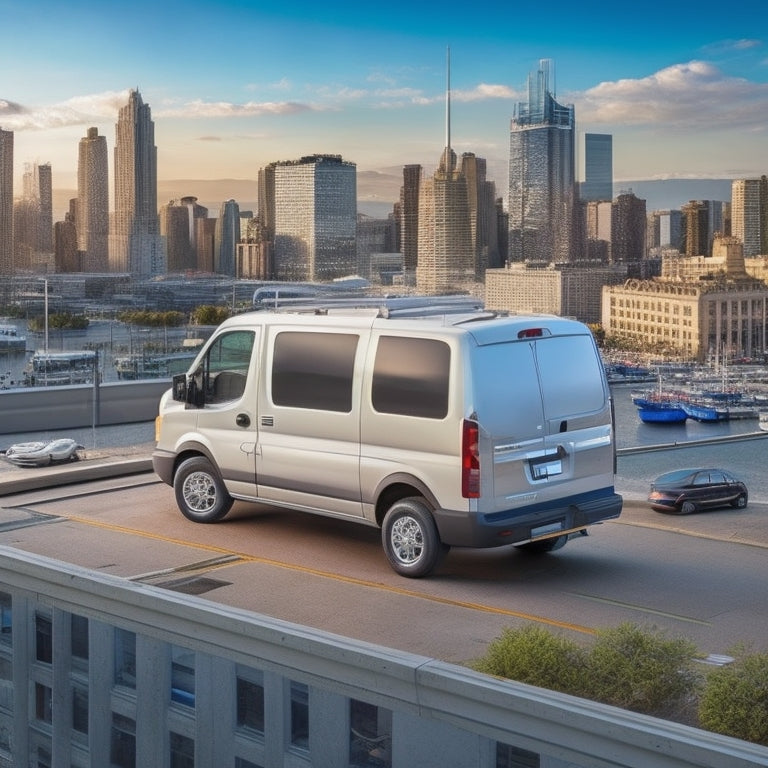
3 Best Fleet Vehicle Panel Installation Cost Factors
Share
When calculating fleet vehicle panel installation costs, you'll need to take into account three key factors. First, your vehicle's size and type impact material and labor costs. Larger vehicles require more materials and labor, while heavier payload capacities demand substantial panels. Next, the complexity of the installation affects labor costs, with complex wiring and mounting systems increasing costs. Finally, the quality of materials and brand choice influence durability and reliability, with reputable brands delivering high-quality products. Understanding these factors will give you a better grasp of installation costs, but there's more to explore when it comes to making the best decisions for your fleet.
Key Takeaways
• Vehicle type and size significantly impact installation costs, with larger vehicles requiring more materials and labor.
• Installation complexity, influenced by panel type, wiring, and mounting systems, affects labor costs and installation time.
• Material quality and brand choice greatly influence costs, with high-quality components ensuring durability, reliability, and safety.
• Durability and reliability considerations, such as maintenance and replacement costs, should be factored into the overall cost calculation.
• A thorough cost-benefit analysis is essential to balance upfront costs with long-term benefits, including potential downtime costs and operational advantages.
Vehicle Type and Size Impact
Your fleet vehicle's type and size greatly influence the panel installation cost, with larger vehicles requiring more materials and labor, which translates to higher costs.
As you consider panel installation for your fleet, it's important to factor in the unique characteristics of your vehicles. For instance, a heavier payload capacity demands more substantial panels, leading to increased expenses.
Similarly, the axle configuration of your vehicle can impact the installation process. A single-axle vehicle will have different requirements than a multi-axle one, affecting the overall cost.
When evaluating your fleet, consider the specific needs of each vehicle. Are they heavy-duty haulers or lightweight transports? Do they have unique features that require custom panel installations?
By understanding the nuances of your fleet, you can better anticipate the costs associated with panel installation. By doing so, you can ensure a safe and efficient installation process that meets your fleet's specific requirements.
Installation Requirements and Complexity
When evaluating the installation requirements, it's crucial to consider the type of panels, wiring, and mounting systems needed. These factors will influence the complexity of the installation and, subsequently, the labor costs.
As you tailor your fleet's panel installation to its unique needs, the complexity of the installation itself becomes a significant cost factor. The more complex the installation, the higher the labor costs will be. Wiring difficulties, for instance, can lead to longer installation times, increasing labor costs and overall expenses.
By understanding the installation requirements, you can better estimate the labor costs and plan your budget accordingly. Remember, a more complex installation will inevitably lead to higher labor costs, so it's crucial to weigh the costs against the benefits of a customized installation.
| Installation Complexity | Impact on Labor Costs |
| Simple Installation (e.g., basic wiring) | Lower Labor Costs |
| Moderate Installation (e.g., custom wiring) | Moderate Labor Costs |
| Complex Installation (e.g., intricate wiring) | Higher Labor Costs |
| Custom Installation (e.g., bespoke wiring) | Highest Labor Costs |
Material Quality and Brand Choice
Choosing the right materials and brands for your fleet vehicle panels can greatly impact the overall installation cost, since high-quality components often come with a higher price tag. As you source materials, you'll want to prioritize durability, reliability, and safety. This means opting for reputable brands with a proven track record of delivering high-quality products.
When it comes to material sourcing, you'll need to balance quality with cost. While it may be tempting to opt for cheaper alternatives, remember that subpar materials can compromise the safety and performance of your fleet vehicles. Instead, look for brands with a strong reputation for delivering high-quality components that meet industry standards. A reputable brand will typically offer warranties or guarantees, giving you added peace of mind.
Frequently Asked Questions
Can I Install Fleet Vehicle Panels Myself to Save Money?
'You're tempted to DIY, but installing fleet vehicle panels yourself can be a perilous journey, fraught with DIY challenges. Don't risk safety; instead, opt for expert labour to guarantee a secure, reliable installation that's worth every penny.'
Are There Any Government Incentives for Eco-Friendly Fleet Vehicles?
You're likely eligible for tax credits and green grants if you're upgrading to eco-friendly fleet vehicles, which can greatly offset installation costs; research government incentives in your area to maximize savings.
How Often Should I Inspect and Maintain My Fleet Vehicle Panels?
Did you know 1 in 5 fleet vehicles experience panel damage due to neglect? You should inspect your fleet vehicle panels every 3,000 miles, following regular schedules to identify wear patterns and prevent costly repairs.
Can I Customize Fleet Vehicle Panels With My Company's Logo or Branding?
You can customize fleet vehicle panels with your company's logo or branding, ensuring logo integration and reinforcing your brand identity. This is a great way to promote your business while maintaining a professional image.
Do Fleet Vehicle Panels Come With a Warranty or Guarantee?
As you invest in fleet vehicle panels, you'll want peace of mind knowing they're built to last; look for manufacturers offering robust warranties and guarantees, with options for extended coverage and protection plans to safeguard your investment.
Related Posts
-

What Do Power Strips Do for Standby Energy?
You're likely aware that your devices, such as TVs and computers, continue to draw power even when turned off, a phen...
-

7 Best Automated Sprinklers for Water-Wise Green Homes
You're likely among the 75% of U.S. homeowners who use in-ground sprinkler systems, and coincidentally, you're also c...
-

7 Top HEPA Filters for Green Building Projects
You need a reliable HEPA filter for your green building project that aligns with your sustainable goals and guarantee...


